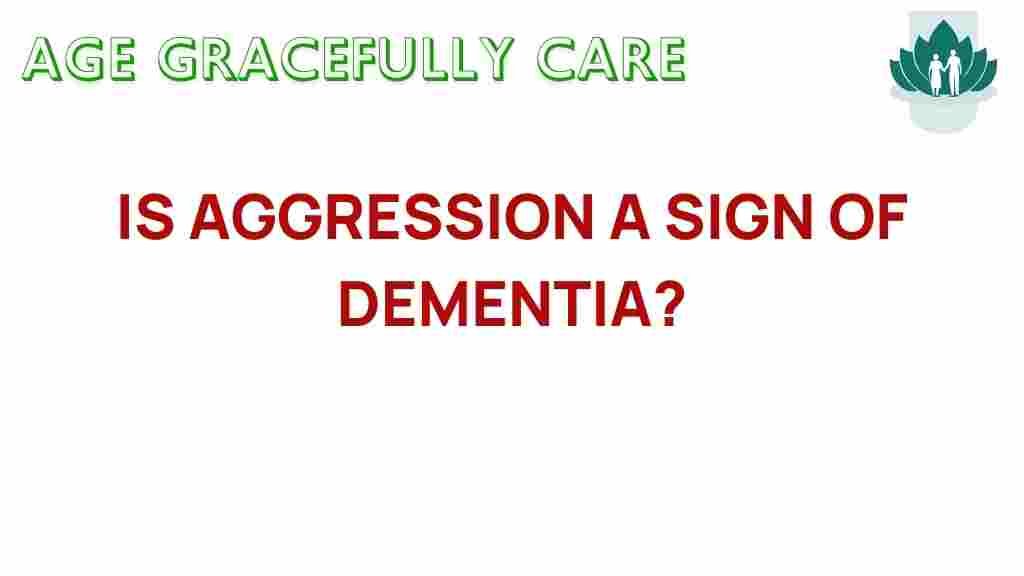Is Aggression a Hidden Indicator of Dementia’s Onset?
Aggression in the elderly is often viewed as a challenging behavior, but it can also serve as a hidden indicator of early dementia symptoms. Understanding the connection between aggression and dementia is crucial for caregivers, healthcare professionals, and families involved in elderly care. In this article, we will explore how aggression can be a sign of cognitive decline, the various symptoms of dementia, and what steps can be taken to address these behavioral changes.
Understanding Aggression in the Context of Dementia
Aggression can manifest in various forms, including verbal outbursts, physical aggression, or withdrawal. It is essential to recognize that these behaviors may arise from underlying neurological disorders, particularly dementia. When an elderly individual exhibits changes in behavior, it may be indicative of cognitive decline.
Common Symptoms of Dementia
Dementia is not a single disease but a term that encompasses various neurological disorders affecting memory, thinking, and social abilities. Here are some common symptoms to watch for:
- Memory loss, particularly short-term memory
- Difficulty with problem-solving or planning
- Confusion about time or place
- Changes in mood or personality
- Withdrawal from social activities
- Aggression or agitation
It is crucial to note that while aggression can be a symptom, it is not exclusive to dementia. It can also arise from other mental health issues or medication side effects.
The Link Between Aggression and Cognitive Decline
The onset of dementia often leads to significant changes in brain function, which can affect mood and behavior. Aggression may occur due to frustration from cognitive decline, inability to communicate effectively, or as a response to confusion. Understanding this link can help caregivers manage these behaviors more effectively.
Identifying Behavioral Changes in the Elderly
Recognizing behavioral changes is vital in monitoring the mental health of elderly individuals. Here are some signs to look for:
- Increased irritability or frustration
- Changes in sleep patterns or appetite
- Heightened anxiety or fearfulness
- Loss of interest in previously enjoyed activities
- Physical aggression or verbal outbursts
Caregivers should document these changes and consult with healthcare professionals for a thorough evaluation.
Diagnosing Dementia and Aggression
Accurate diagnosis is critical to differentiate between dementia and other potential causes of aggression. Healthcare professionals typically follow these steps:
- Medical History Review: A thorough review of the individual’s medical history, including any previous mental health issues.
- Physical Examination: A complete physical examination to rule out other medical conditions.
- Cognitive Testing: Standardized tests to assess memory, problem-solving skills, and other cognitive functions.
- Behavioral Assessment: Observations of the individual’s behavior and mood in various settings.
- Neurological Evaluation: Imaging tests, such as CT or MRI scans, may be necessary to examine brain structure and function.
Once a diagnosis is established, appropriate treatment and care strategies can be developed.
Steps to Manage Aggression in Dementia Patients
Managing aggression in individuals with dementia requires a multifaceted approach. Here are some effective strategies:
1. Create a Calm Environment
Reducing environmental stressors can help minimize aggression:
- Keep noise levels low.
- Maintain a consistent routine.
- Ensure adequate lighting to prevent confusion.
2. Use Clear Communication
Clear and simple communication can reduce frustration:
- Speak slowly and clearly.
- Use non-verbal cues and gestures.
- Stay patient and listen actively.
3. Engage in Meaningful Activities
Encouraging participation in enjoyable activities can improve mood:
- Incorporate hobbies and interests.
- Encourage social interactions, whether in-person or virtual.
- Use music or art therapy as a means of expression.
4. Seek Professional Help
If aggression escalates, professional intervention may be necessary:
- Consult a geriatrician or neurologist for medication options.
- Consider counseling or support groups for caregivers.
- Explore alternative therapies, such as cognitive-behavioral therapy.
5. Educate Family Members and Caregivers
Education is key to understanding and managing aggression:
- Provide training on how to handle aggressive behaviors.
- Encourage open discussions about feelings and concerns.
- Share resources on dementia and caregiving strategies.
Troubleshooting Tips for Caregivers
For caregivers dealing with aggression in dementia patients, here are some troubleshooting tips:
- Stay Calm: Your reaction can influence the patient’s behavior. Remain calm and composed.
- Redirect Attention: Divert their focus to a different activity or topic.
- Avoid Confrontation: If a patient becomes aggressive, avoid arguing or confronting them directly.
- Monitor Triggers: Keep track of what precedes aggressive episodes to identify potential triggers.
- Practice Self-Care: Caregiving can be stressful, so ensure you take time for yourself.
Research and Resources
Staying informed about dementia and aggression can aid in better management. Resources such as the Alzheimer’s Association provide valuable information for families and caregivers. Additionally, consider reading recent studies on the relationship between aggression and dementia to deepen your understanding.
Conclusion
Aggression can indeed be a hidden indicator of dementia’s onset, often masking deeper cognitive declines and mental health challenges. Recognizing the symptoms of dementia, understanding the connection between aggression and cognitive decline, and taking appropriate management steps are essential for effective elderly care. By creating a supportive environment, employing clear communication, and seeking professional help when necessary, caregivers can significantly improve the quality of life for those affected by dementia.
As we continue to learn more about neurological disorders, staying informed and proactive can make a world of difference in managing the behavioral changes associated with dementia. Remember, early diagnosis and intervention are key to addressing the complexities of aggression and dementia.
This article is in the category Health and created by AgeGracefullyCare Team
